
Caetano Emanuel Viana Teles Veloso is a Brazilian composer, singer, guitarist, writer, and political activist. Veloso first became known for his participation in the Brazilian musical movement Tropicália, which encompassed theatre, poetry and music in the 1960s, at the beginning of the Brazilian military dictatorship that took power in 1964. He has remained a constant creative influence and best-selling performing artist and composer ever since. Veloso has won nine Latin Grammy Awards and two Grammy Awards. On 14 November, 2012, Veloso was honored as the Latin Recording Academy Person of the Year.

Gilberto Passos Gil Moreira, is a Brazilian singer-songwriter and politician, known for both his musical innovation and political activism. From 2003 to 2008, he served as Brazil's Minister of Culture in the administration of President Luiz Inácio Lula da Silva. Gil's musical style incorporates an eclectic range of influences, including rock, Brazilian genres including samba, African music, and reggae.

Os Mutantes are an influential Brazilian rock band that were linked with the Tropicália movement, a dissident musical movement during the Brazilian dictatorship of the late 1960s. The band is considered to be one of the main groups of Brazilian rock. Heavily influenced by Anglo-American psychedelic pop, they bridged Brazilian sensibilities together with studio trickery, feedback, distortion, and musique concrète. They released their now-acclaimed self-titled debut album in 1968.
Tropicália, also known as tropicalismo, was a Brazilian artistic movement that arose in the late 1960s. It was characterized by the amalgamation of Brazilian genres—notably the union of the popular and the avant-garde, as well as the melding of Brazilian tradition and foreign traditions and styles. Today, tropicália is chiefly associated with the musical faction of the movement, which merged Brazilian and African rhythms with British and American psychedelia and pop rock. The movement also included works of film, theatre, and poetry.
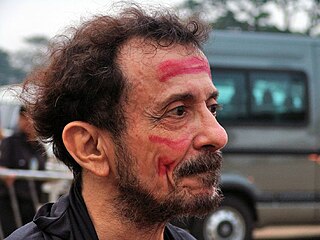
Antônio José Santana Martins, known professionally as Tom Zé, is a Brazilian singer-songwriter, multi-instrumentalist, and composer who was influential in the Tropicália movement of 1960s Brazil. After the peak of the Tropicália period, Zé went into relative obscurity: it was only in the 1990s, when musician and Luaka Bop label head David Byrne discovered Zé's 1975 album Estudando o Samba and then released reissues of his work, that Zé returned to performing and releasing new material.

Eduardo de Góes "Edu" Lobo is a Brazilian singer, guitarist, and composer.

Música popular brasileira or MPB is a trend in post-bossa nova urban popular music in Brazil that revisits typical Brazilian styles such as samba, samba-canção and baião and other Brazilian regional music, combining them with foreign influences, such as jazz and rock.

Rita Lee Jones was a Brazilian singer, songwriter, multi-instrumentalist, presenter, actress, writer, and activist. Known as the "Queen of Brazilian Rock," she sold more than 55 million records, making her the most successful female artist by record sales in Brazil and the fourth overall, behind Tonico & Tinoco, Roberto Carlos, and Nelson Gonçalves. She built a career that started with rock but over the years flirted with various genres, such as psychedelia during the tropicalia era, pop rock, disco, new wave, pop, bossa nova, and electronic, creating a pioneering hybrid between international and national genres.

Gal Maria da Graça Costa Penna Burgos, known professionally as Gal Costa ( ), was a Brazilian singer of popular music. She was one of the main figures of the tropicalia music scene in Brazil in the late 1960s and appeared on the acclaimed compilation Tropicália: ou Panis et Circencis (1968). She was described by The New York Times as "one of Brazil's greatest singers."

Maria Bethânia Viana Teles Veloso is a Brazilian singer and songwriter. Born in Santo Amaro, Bahia, she started her career in Rio de Janeiro in 1964 with the show "Opinião" ("Opinion"), she is "The Queen of Brazilian Music". Due to its popularity, with performances all over the country, and the popularity of her 1965 single "Carcará", the artist became a star in Brazil.

Os Mutantes is the debut album by the Brazilian tropicalia band Os Mutantes. It was originally released in 1968 by Polydor and blends traditional Brazilian music styles with American and British psychedelia. The album includes a cover of The Mamas & The Papas' "Once Was a Time I Thought", translated into "Tempo no Tempo", and a cover of "Le premier bonheur du jour", previously recorded by Françoise Hardy. It was reissued in 1999 on Omplatten Records and again in 2006 by Omplatten's parent company, Universal Records.
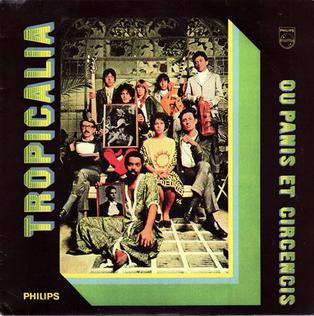
Tropicália ou Panis et Circencis is a 1968 collaboration album by artists including Gilberto Gil, Caetano Veloso, Tom Zé, Nara Leão, Os Mutantes and Gal Costa. Considered an important record in the Tropicália movement and in the history of Brazilian music, it features orchestral arrangements by Rogerio Duprat and lyrical contributions from Torquato Neto.
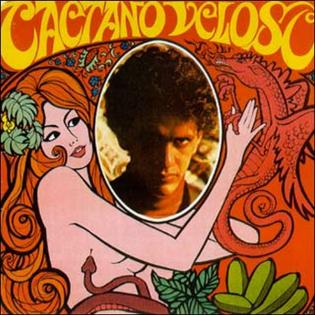
Caetano Veloso is the debut solo album by the artist of the same name, released in Brazil in 1968. He had released Domingo the year before in collaboration with Gal Costa. It was one of the first Tropicália efforts, and features arrangements by Júlio Medaglia, Damiano Cozzella, and Sandino Hohagen, as well as an eclectic assortment of influences, demonstrating the "antropofagia" of the Tropicália movement. Sounds from psychedelia, rock, pop, Indian music, bossa nova, Bahian music and other genres appear on the album. It includes the hit songs "Alegria, Alegria", "Tropicália", and "Soy loco por ti, América".

Caetano Veloso is an album released in Brazil in 1969, being the third album by Caetano Veloso, his second solo release.

Domingo (transl. Sunday) is the debut studio album by Gal Costa and Caetano Veloso. It was released on Philips Records in 1967.
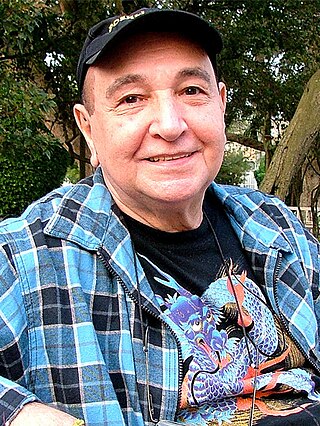
João Donato de Oliveira Neto was a Brazilian jazz and bossa nova pianist as well as a trombonist from Rio Branco. He first worked with Altamiro Carrilho and went on to perform with Antonio Carlos Jobim and Astrud Gilberto. Because of the area he grew up in Brasil he was able to hear Cuban music on the radio. This influence would manifest itself in many of his compositions, piano, and trombone playing. Donato's most well-known compositions include: "Amazonas", "Lugar Comum", "Simples Carinho", "Até Quem Sabe" and "Nasci Para Bailar".

Doces Bárbaros is a 1976 album by the Música popular brasileira supergroup of the same name. It was recorded June 24 of that year at Anhembi Stadium in São Paulo. Its members were Gilberto Gil, Caetano Veloso, Maria Bethânia and Gal Costa, four of the biggest names in the history of the music of Brazil. The band was the subject of a 1977 documentary directed by Jom Tob Azulay. In 1994, they performed a tribute concert to Mangueira school of samba.
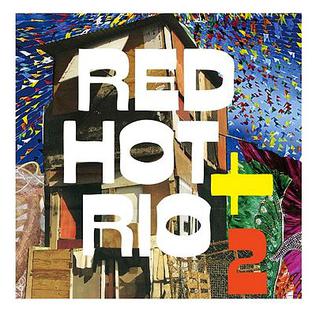
Red Hot + Rio 2 is a collaborative album released June 28, 2011 as part of the Red Hot Organization's series of tribute music records that aim to raise money for HIV/AIDS awareness and prevention. The album aimed to pay homage to the influence of the Tropicália genre and cultural movement that arose in Brazil in the late 1960s. The Tropicália movement was noted for its genre-bending sound that melded influences of 'traditional' Brazilian music like samba, forro, and Bossa Nova with international styles of pop, rock, funk, and soul music. Likewise, Red Hot + Rio 2 included collaborations of some of the Brazilian artists that pioneered the Tropicália movement along with international artists from various genres.

Gal or Gal Costa is the second album by Brazilian singer Gal Costa, released months after the first album Gal Costa. To distinguish it from Costa's previous release, the album is sometimes referred to as Cinema Olympia, the title of its first track. It is considered by the public and critics alike as her most psychedelic and experimental album. The music in the album has been considered unprecedented. Andy Beta of The Pitchfork Review described the album as "the equivalent of Barbra Streisand recording with Boredoms" and "one of the heaviest documents of Tropicália."
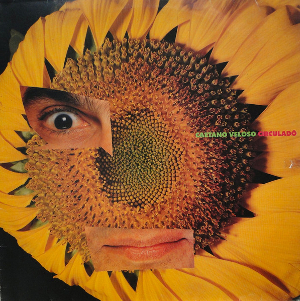
Circuladô is an album by the Brazilian musician Caetano Veloso. It was released in 1991. Circuladô was Veloso's third album to be widely distributed in the United States.


















